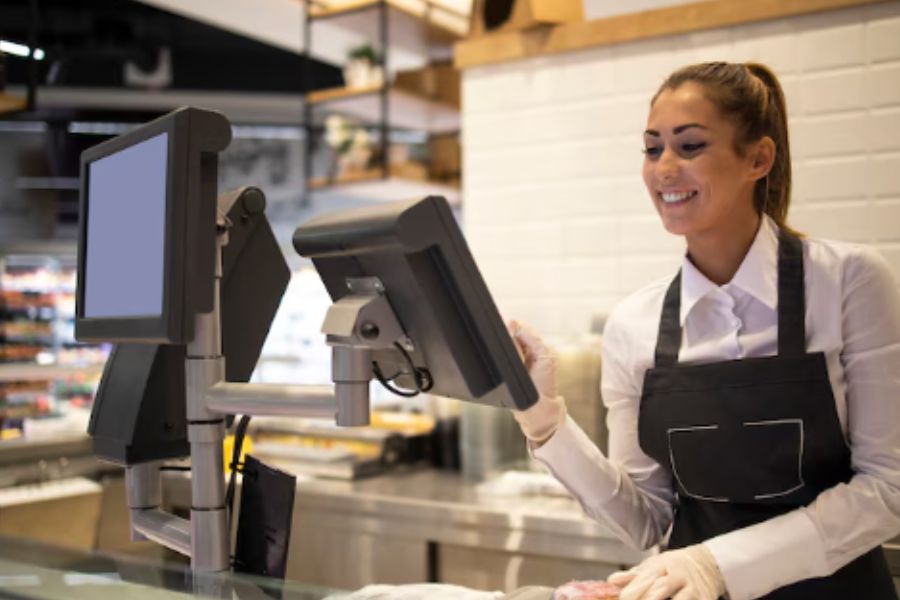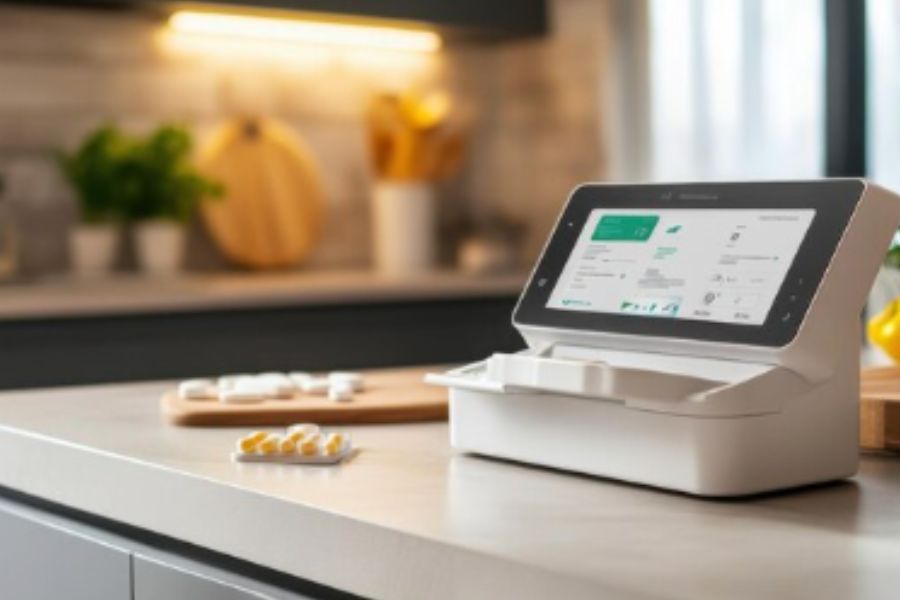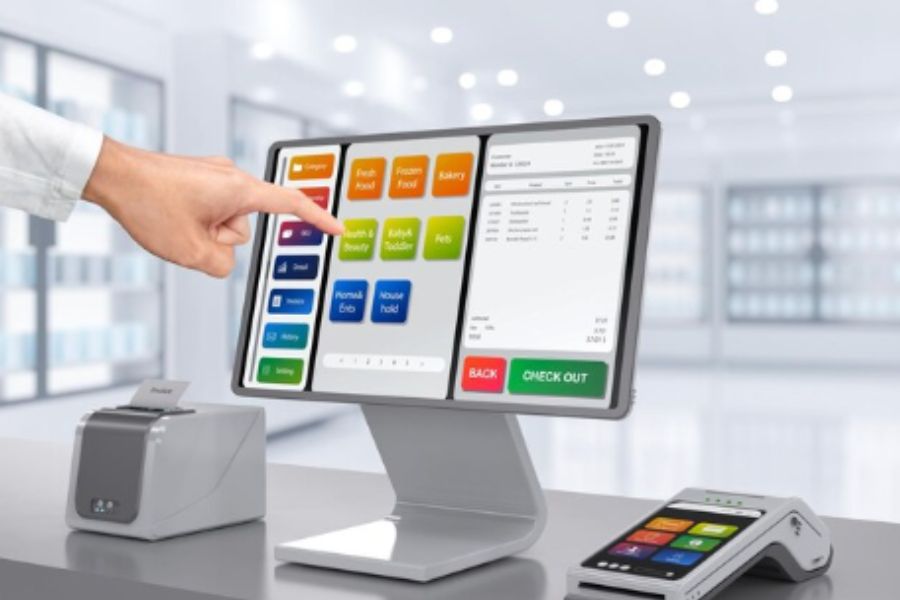A POS system for wholesale business streamlines transactions, inventory management, and customer relationships at scale. Opposite to retail POS systems, wholesale solutions handle bulk orders, multiple price tiers, and complex B2B relationships. These systems integrate purchase orders, warehouse management, and sales analytics to help wholesalers make data-driven decisions. Modern wholesale POS platforms automate routine tasks, track stock levels across locations, and maintain detailed client histories. They also facilitate quick order processing and provide real-time insights into business performance. Let’s explore how a wholesale POS system can transform your operations.
Highlights:
- A POS system for wholesale businesses is a software solution that manages bulk transactions, tracks large-scale inventory, and supports customer and supplier relationships tailored to B2B operations.
- Distinctive features include bulk order processing, tiered pricing, purchase order management, credit limit tracking, and multi-location inventory control.
- When choosing a wholesale POS, consider its ability to handle high-volume orders, integrate with accounting and ERP systems, support flexible pricing models, and scale with business growth.
What is A POS System for Wholesale Business?
Definition
A Wholesale POS (Point of Sale) system is specialized software that manages bulk transactions and B2B operations. While retail POS systems that process individual consumer sales, wholesale POS platforms focus on business-to-business transactions.
These systems handle the distinct complexities of wholesale commerce, such as large-volume orders, tiered pricing structures, and recurring business relationships.
Designed for companies that sell products to other businesses rather than end consumers, wholesale POS systems serve as the technological backbone for inventory control, order processing, and business relationship management in the wholesale sector.
Differences between POS for B2B and POS for B2C
This table showcases the differences between POS for B2B and POS for B2C:
| Criteria | B2B POS | B2C POS |
| Customization and Flexibility | Customization for bulk orders, tiered pricing, and client-specific terms. | Flexibility for promotions and loyalty programs for consumers. |
| B2B-Specific Features | Includes dropshipping, purchase orders, supplier management, and advanced order fulfillment. | Not applicable. |
| Inventory Management | Requires robust systems for bulk quantities, multiple warehouses, and supplier integration. | Focuses on individual item tracking and real-time stock updates. |
| Pricing and Discounts | Supports complex pricing, volume-based discounts, and client-specific rates. | Typically fixed pricing with general promotions. |
| Payment Processing | Supports invoicing, credit terms, and bulk payments. | Emphasizes quick transactions with multiple payment methods. |
| Reporting and Analytics | Comprehensive reports on large orders, client accounts, and supply chain data. | Focus on individual transactions and consumer behavior. |
| User Interface | More complex interfaces for detailed order entry, account management, and inventory. | Simplified for quick, intuitive use in retail settings. |
Core Features of Wholesale POS Systems
Wholesale companies require specialized POS solutions that differ from standard retail systems. These solutions include advanced functionalities designed for large-scale operations:
Advanced inventory management
- Multi-location tracking: A centralized system monitors and manages stock levels across multiple warehouses and store locations, providing complete visibility of all inventory in a single dashboard.
- Batch and serial number tracking: Monitor specific product batches and individual items through unique identifiers, making recalls, warranties, and quality control processes more efficient and accurate throughout the supply chain.
- FIFO/LIFO implementation: These inventory management methods improve supply chain accuracy and traceability, ensuring proper stock rotation and maintaining product freshness or relevancy.
- Bin location management: Assign and track specific storage locations to products within warehouses, enabling quick product location and efficient order fulfillment processes.
- Cash and carry inventory management: Enable immediate sales transactions where customers can purchase and collect merchandise instantly, supporting faster inventory turnover and improved cash flow.
Warehouse Optimization
- Pick pack ship automation: Streamline the fulfillment process by automating picking lists, reducing manual errors, and accelerating order processing through systematic workflows.
- System-generated picking lists: Create optimized routes for warehouse staff and automate packing slip creation, maximizing efficiency in order preparation.
- Shipping carrier integration: Connect directly with multiple shipping providers to streamline logistics, automatically generate labels, and track shipments.
- 3PL fulfillment partnerships: Integrate with third-party logistics providers to reduce operational overhead and leverage expert warehousing and shipping services.
- Real-time stock monitoring: Get instant updates on inventory levels across all locations as sales occur, ensuring accurate stock information at all times.
- Automated reorder points: Set system triggers to maintain optimal inventory levels and prevent stock outs through automated purchase order generation.
- Multi-channel inventory sync: Keep stock levels accurate across all sales channels, including eCommerce platforms and physical locations.
Supplier Management Tools
- Purchase order automation: The system intelligently generates and distributes purchase orders based on current inventory levels and predictive sales data. It monitors each PO through its lifecycle, tracking status updates from creation to delivery.
- Supplier performance tracking: A comprehensive monitoring system evaluates supplier reliability metrics, including delivery timeliness and order accuracy rates. The platform includes tools to compare supplier pricing, enabling strategic cost optimization.
B2B-Specific Features
- Dropshipping management: The system streamlines dropshipping operations by automating shipment notifications between all parties. It coordinates communication between retailers, suppliers, and customers while maintaining order visibility.
- Fulfillment process control: Advanced B2B order fulfillment features cater to manufacturing businesses serving other companies. The system handles complex scenarios including partial shipment management, multi-location fulfillment coordination, and systematic backorder processing.
Considerations to Choose the Right POS System for Wholesale Business
Selecting the right Wholesale POS system requires carefully assessing several vital factors. Consider the following elements to ensure the system meets your unique demands:
Business Scale
Scalability ranks as a primary consideration among small to medium-sized wholesalers when selecting their POS solutions.
Small businesses with annual revenue under $5 million typically benefit from cloud-based solutions that offer essential features like inventory management and basic reporting. These systems reduce upfront costs by approximately 25% annually and require minimal maintenance.
In contrast, medium-sized businesses ($5-50 million revenue) processing 500-5000 monthly orders need more sophisticated features, including iPad compatibility, advanced analytics, multi-location management, and integration capabilities with ERP and CRM systems.
Large enterprises exceeding $50 million in revenue require comprehensive solutions that manage complex pricing structures and extensive inventory exceeding 10,000 SKUs, often incorporating AI-powered supply chain forecasting and real-time monitoring capabilities.
Industry-Specific Requirements
Each wholesale sector demands unique POS functionalities to address specific operational challenges. For example:
- Food and Beverage Distribution
The system must include lot tracking capabilities and expiration date management tools to maintain product safety and freshness. FSMA compliance features help meet regulatory requirements and ensure proper food safety protocols throughout the supply chain.
- Electronics and Technology Wholesale
Serial number tracking functionality supports warranty management for electronic components and devices. The electronic POS system adapts to rapid market price changes, allowing dynamic pricing adjustments to maintain competitive margins in this fast-moving sector.
- Apparel and Textile Distribution
Matrix inventory management handles multiple variations in size, color, and style combinations. Seasonal forecasting tools of apparel POS help predict inventory needs based on fashion cycles, supporting effective wholesale planning and stock management.
Budget and cost considerations
When selecting a POS system for your wholesale business, budget plays a central role in the decision-making process. Most wholesale businesses invest 5-10% of their annual revenue in POS systems, making analyzing both immediate and long-term financial implications essential. The total cost includes hardware, software, support services, and potential hidden fees.
The choice between cloud-based and on-premise systems affects your budget differently. Cloud POS systems typically require lower upfront costs but include ongoing subscription fees, making them suitable for businesses seeking flexibility and scalability. On-premise solutions demand higher initial investment but offer more control over long-term expenses.
Additional costs may include transaction fees, payment processing charges, and third-party app integration expenses, which should be factored into your budget planning.
ConnectPOS for Wholesale Business Management
ConnectPOS is a leading POS solution for wholesale businesses through its cloud-based system and MSI capabilities. The platform excels at managing bulk orders and optimizing inventory across multiple locations, addressing core wholesale operation needs.
At the heart of ConnectPOS lies a robust set of wholesale tools designed for efficient business operations. The system offers flexible custom pricing tiers that automate bulk pricing rules, including multiple price levels, contract prices, and quantity discounts. Its unified commerce approach streamlines operations by connecting POS with wholesale eCommerce platforms, creating a seamless integration between online and offline sales channels.
ConnectPOS enhances operational efficiency through streamlined order fulfillment and extensive integration capabilities. The system manages wholesale orders through bulk processing tools, automated workflows, and precise inventory tracking. Its seamless integration with ERP systems, accounting software, POS CRM, and payment gateways creates a scalable wholesale operation.
Users can customize features according to specific business requirements, from bulk pricing structures to flexible checkout options, making ConnectPOS a comprehensive solution for wholesale businesses focused on growth.
Final Thoughts
A POS system for wholesale business is the backbone of the whole operation, streamlining complex transactions and inventory management processes. Selecting the right system requires careful consideration of your business needs, budget, and growth plans. The best wholesale POS solutions, such as ConnectPOS, offer comprehensive features including bulk order management, custom pricing tiers, and multi-location inventory control.
The right POS system transforms your wholesale business into an efficient, data-driven operation. It automates manual tasks, reduces errors, and provides valuable insights for better decision-making. Contact ConnectPOS for a robust solution that adapts to your wholesale business requirements and supports your path to growth!
FAQs: POS System for Wholesale Business
Can a wholesale POS system integrate with my existing software?
Most modern wholesale POS systems offer integration with common business software including accounting programs, ERP systems, eCommerce POS platforms, shipping software, and CRM tools through APIs or direct connections.
How much does a wholesale POS system cost?
Pricing varies based on features, number of users, and deployment method. Basic systems start around $50-100 per month, while comprehensive enterprise solutions may cost several thousand dollars monthly. Many providers charge additional fees for hardware, implementation, training, and premium support.
Is cloud-based or on-premise POS better for wholesale?
Cloud-based systems offer accessibility from anywhere, automatic updates, and lower upfront costs. On-premise solutions provide more control over data and can operate without internet connectivity. Your business size, technical resources, and operational needs should guide this decision.
What hardware components will I need?
Common hardware includes barcode scanners, receipt printers, cash drawers, card readers, touchscreen monitors or tablets, and potentially mobile devices for warehouse scanning. The specific configuration depends on your business model and sales environment.



